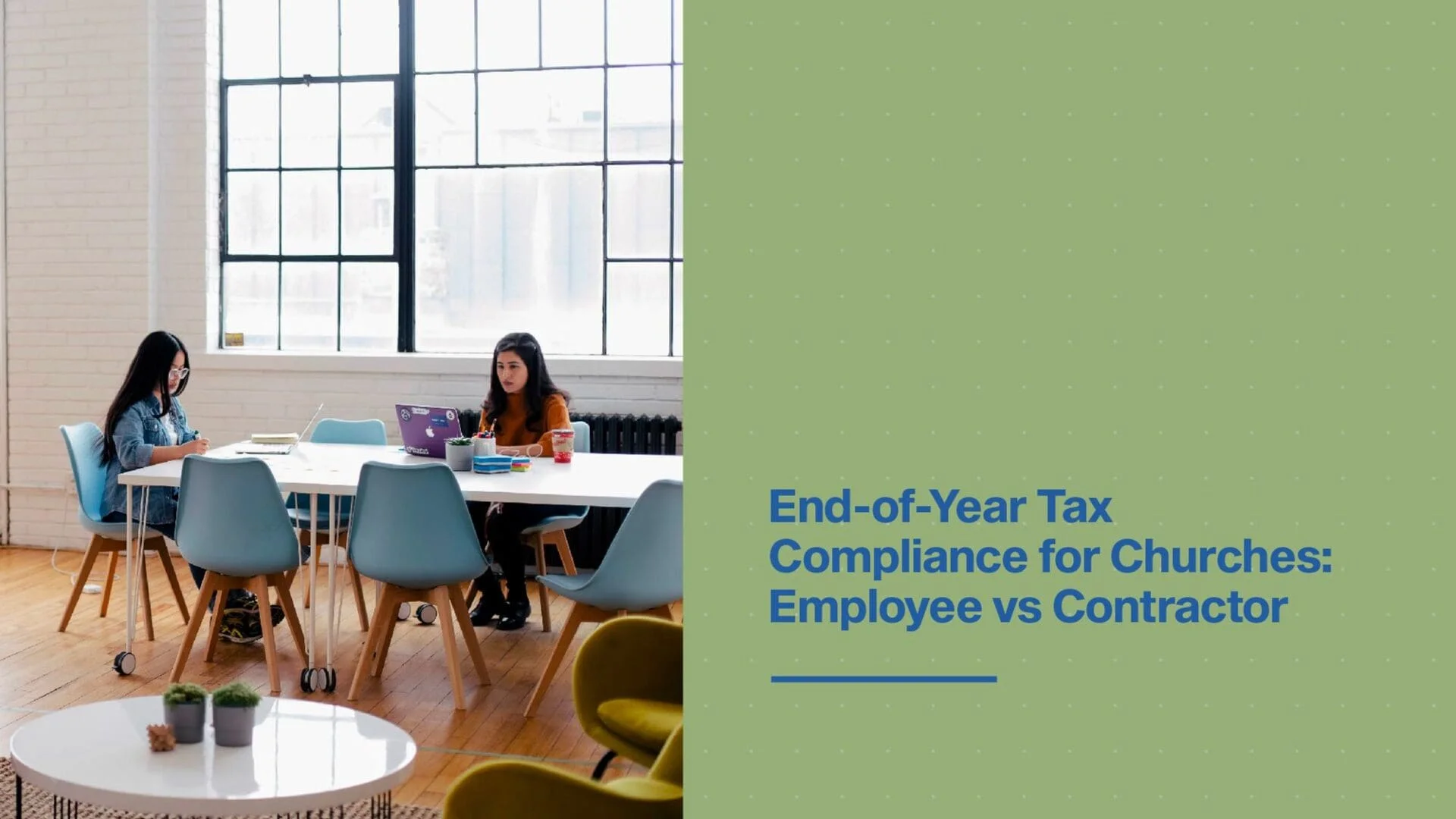
Churches may be non-profits that generally don’t pay taxes or operate like a traditional business. But they’re a legal organization, all the same.
One of the biggest organizational expenses for most churches comes through payroll. Between full-timers, part-timers, contractors, and freelancers, there are plenty of different people you can work with (and compensate) as a ministry.
The tricky part is figuring out who is who when it comes to tax compliance. Here’s a brief primer on the difference between employees and contractors in church and what you need to consider for your own church’s accounting when it comes time for tax season.
Let’s start with the big question. Who is an employee, and who is a contractor? In a world where 64 million professionals were freelancing in 2023, it’s easy to have a thorough mixture of both employees and independent contractors within your ministry.
Let’s begin by clarifying that there isn’t a single formula or litmus test that everyone can follow here. Instead, we have a collection of rules, regulations, and guidelines that help make the distinction. For example, the IRS defines two kinds of workers:
The U.S. Department of Labor also defines the difference in the context of the Fair Labor Standards Act (FLSA). The DoL explains,
“If the economic realities show that the worker is economically dependent on the employer for work, then the worker is an employee. If the economic realities show that the worker is in business for themself, then the worker is an independent contractor.”
These are the basic parameters that you’ll see most often utilized when differentiating between employees and contractors. But, as with all things related to Uncle Sam, things aren’t quite as simple as they appear on the surface.
When it comes to deciding who on your team is an employee and who is a contractor, there is plenty of room for nuance, which is always fun when you’re trying to tend to your taxes. The IRS elaborates that contractors can be “statutory employees” (basically contractors considered employees for tax purposes) if they meet certain criteria, such as working as a delivery driver or traveling salesperson. Statutory non-employees are also a category, as are government workers (which aren’t a concern in a church setting).
The point is that it isn’t always as simple as slapping the contractor or employee label on someone. You really need to consider what it is that they’re doing for your church.
If you’re in doubt, it can be safer to lean on the side of employee status. However, that comes with extra costs, such as payroll tax, unemployment tax, and FLSA overtime rules.
Consider the example of a musician. If you hire a worship leader to help with Sunday morning services, they can function as either a contractor or an employee. If you genuinely give them full decision-making power to arrange practices, set up teams, and otherwise prepare each service, and you simply pay them for the final product (the worship service itself), they are functioning as a contractor.
However, if you exhibit a degree of control over any of those elements, the individual may be an employee. If you’re in doubt, XPastor.org points out that a conservative approach is to simply go the employee route.
Whatever you decide to do, it’s wise to also put it in writing and have both parties agree and sign. You don’t want to get too overbearing or legalistic as a church, but dotting your “i’s” and crossing your “t’s” can ensure everyone is on the same page.
What about the elephant in the room? Are pastors employees or contractors? While they may be the primary role in most churches, pastors are technically considered self-employed by the IRS. That means they have to follow self-employed rules when paying Social Security tax.
However, a pastor is also considered a common-law employee in the context of federal income tax. This gives them the unique classification of having “dual tax status.” It’s also important to remember that pastors can often write off their housing allowance on their taxes.
Let’s point one more thing out before wrapping things up. This isn’t a game. If you misclassify your employees or contractors, it can create a liability for your church.
For example, the IRS explains that if you misclassify an employee as a contractor, you may be on the hook to pay employment taxes. This is obviously not an ideal development for your church or its employees, which is why you want to consider the status of each member of your team carefully.
This is also an area where working with a professional accounting firm like Chaney & Associates can provide peace of mind. We aren’t just trained, licensed, and experienced accountants. We are a firm entirely devoted to providing faith-based accounting services and software tailored to ministry needs.
We have intimate knowledge about the distinctions between an employee and a contractor. We can help you make sense of the nuances involved in your church’s payroll and walk you through the tax compliance forms you need to fill out. Our team members can help relieve the financial pressure that comes with church payroll so that you can focus on what matters most: your ministry.
